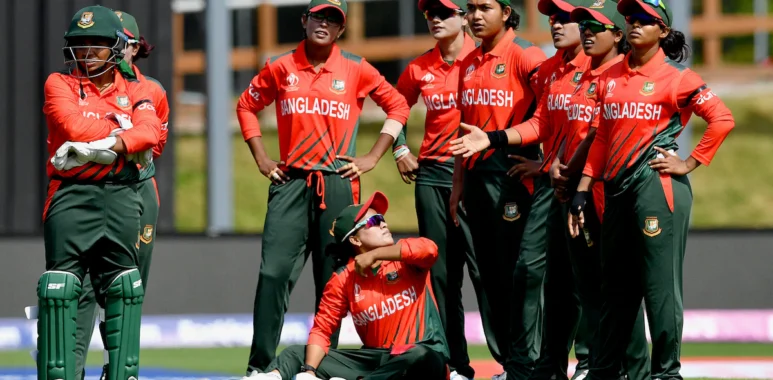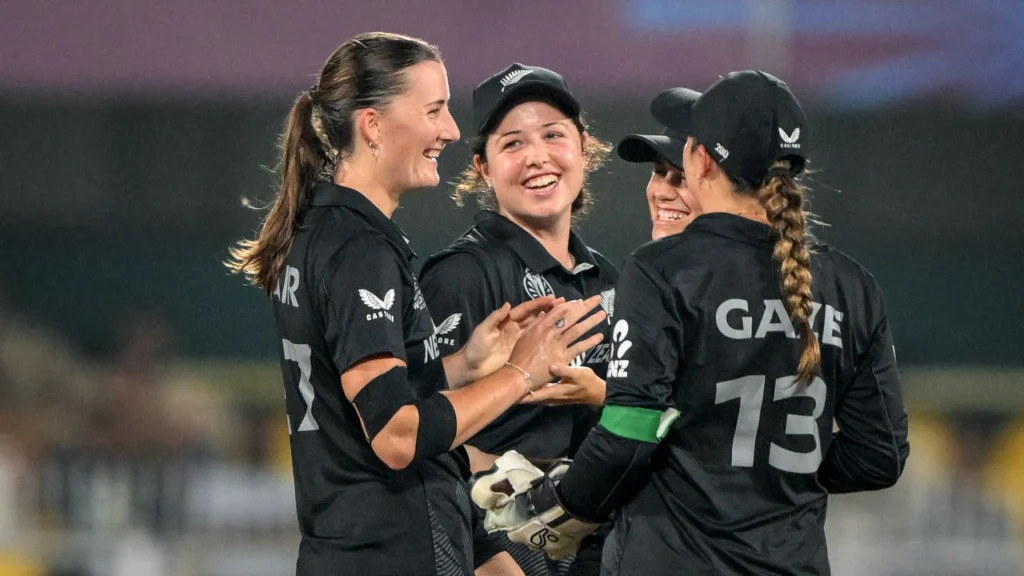
New Zealand Demolish Bangladesh by 100 Runs in Dominant Display
In a stark reminder of the gulf between established powers and emerging contenders, New Zealand Women inflicted a 100-run thrashing on Bangladesh Women in Match 11 of the ICC Women’s World Cup 2025 at Seddon Park in Hamilton on October 10. Electing to bat first after a toss skewed by overcast skies, the White Ferns compiled a formidable 227 for 9, fueled by Suzie Bates’ elegant 76 and a late cameo from Lea Tahuhu, before their bowlers—led by Amelia Kerr’s 4 for 23—ripped through Bangladesh for a paltry 127 in 39.5 overs. This emphatic victory propelled New Zealand to second on the points table with two wins from two, their net run rate rocketing to +1.567, while Bangladesh, outclassed in all facets, slumped to their second loss, NRR cratering to -1.234 and semi-final whispers turning to silence.
The morning fixture, played under drizzly Canterbury clouds that relented just in time, attracted a hardy crowd of 9,000, many bundled in woolens cheering the hosts’ resurgence after a T20 drought. The pitch, a green-tinged beauty with carry and seam, favored the bowlers early, morphing into a batter’s ally by tea. Captain Sophie Devine’s aggressive blueprint—backing youth like Kerr amid veterans’ nous—yielded a blueprint for success, contrasting Bangladesh’s disjointed effort under Nigar Sultana. As the Kiwis celebrated with a haka under clearing skies, Bangladesh’s dugout huddled in reflection, their bowlers expensive and batters brittle ahead of a daunting Australia. This mismatch, while lopsided, highlighted the tournament’s evolution: New Zealand’s blend of experience and fire extinguishing Bangladesh’s spark.
Devine’s toss win was a boon, inserting herself to exploit the moisture and Bangladesh’s seam frailties. New Zealand’s XI balanced attack and depth: Bates, Devon Conway—no, wait, women’s: Suzie Bates, Georgia Plimmer, Devine (c), Brooke Halliday, Maddy Green, Katey Martin (wk), Amelia Kerr, Leigh Kasperek, Tahuhu, Jess Kerr, and Molly Penfold. The debut of Penfold, a promising left-armer, over Hannah Rowe added zip, while Amelia Kerr’s leg-spin was the trump. Bangladesh, chasing redemption after their opener win over Pakistan, fielded: Dilara Akter, Fargana Hoque, Nigar Sultana (c & wk), Ritu Moni, Fahima Khatun, Nahida Akter, Lata Mondal, Marufa Akter, Rabeya Khan, Sultana Khatun, and Jahanara Alam. Rabeya’s leggies mirrored Kerr’s threat, Marufa’s express pace the X-factor on a seamer’s paradise.
Umpires Chris Gaffaney and Kim Cotton oversaw proceedings amid the Waikato chill, the anthems a prelude to a one-sided saga. Bates and Plimmer strode out, eyeing Bangladesh’s new ball.

New Zealand’s innings began solidly, their openers milking the conditions with deft touches before unleashing. Bates, the evergreen opener in her 300th ODI, eased the nerves: she clipped Jahanara off her pads for four in the third over, her timing a lesson in patience. Plimmer, aggressive from the outset, pulled Marufa for six over midwicket in the fifth, the ball thudding into the grass banks. The powerplay yielded 42 for no loss, boundaries sparse but singles sharp—Bates’ dabbed two off Rabeya a cheeky nurdle. Bangladesh’s seamers toiled, but wides (five early) inflated the score, Sultana’s shouts for tighter lines echoing unanswered.
The first breakthrough arrived at 53 for 1 in the 12th: Rabeya’s googly turned square into Plimmer’s pads, lbw for 22 off 35—the review brushing leg stump. Devine joined Bates, and intent ignited: Devine lofted Khatun over cover for four, her follow-through muscular. Bates, reaching fifty off 62 balls with a flicked boundary off Marufa—her 45th ODI half-century—anchored, while Devine whipped Jahanara through square leg. Their 68-run stand off 78 balls pushed to 121 for 1 at drinks, the required rate a mere afterthought.
Post-interval, Bangladesh struck back. Sultana Khatun, the off-spinner, deceived Devine with drift—caught at slip by Fargana for 32 off 41, the edge carrying low. Halliday arrived watchfully, nurgling singles, but fell to a Marufa yorker at 149 for 3 in the 28th—bowled for 18 off 32, her middle stump shattered. Green and Bates rebuilt: Green’s swept four off Rabeya, Bates’ straight drive off Jahanara racing away. Their 42-run stand off 52 balls crawled to 191 for 3 by the 35th, but Kerr’s promotion sparked: she slog-swept Khatun for six, racing to 15 off 10.
Bates’ vigil ended at 76 off 92—eight fours—a mistimed pull off Marufa caught at deep square for a soft dismissal. Martin scratched 4 before edging Rabeya to Nigar, 208 for 5 in 40th. Amelia Kerr and Kasperek rallied: Kerr’s reverse sweep for four off Nahida, Kasperek’s pulled six off Lata. But Bangladesh’s spinners clawed: Rabeya bowled Kasperek for 12 off 15 with a quicker one, Jess Kerr holed out to long-on off Khatun for 5—220 for 7 in 46th. Tahuhu’s late fireworks—two fours and a six off Marufa—added 7 off 4, Penfold unbeaten on 0 as New Zealand closed at 227 for 9. Bangladesh’s attack—Rabeya 3-47, Marufa 3-52—fought valiantly, but 28 extras stung; Devine reflected, “Suzie’s class set the tone; we adapted to the swing.”

Bangladesh’s reply was a procession of peril from the start, their top order crumbling under New Zealand’s seam-spin vice. Dilara Akter and Fargana opened against Tahuhu’s bounce: Dilara flicked Penfold fine for four, but Fargana edged Jess Kerr’s outswinger to Martin for 2 off 6 in the fourth over—8 for 1. Nigar joined Dilara, but the required rate climbed as dots mounted: Nigar’s defensive prod off Tahuhu, Dilara’s tentative push. At 25 for 1 after 10 overs, needing 203 off 240, Bangladesh scratched.
Tahuhu’s return was venomous: she clean bowled Dilara for 12 off 28 with an inswinger that jagged back—25 for 2 in 12th. Ritu Moni entered aggressively, pulling Penfold for four, but succumbed to Amelia Kerr’s leg-spin—stumped off a wide googly for 8 off 15, Martin’s gloves swift. At 38 for 3 after 15 overs, Bangladesh reeled. Nigar and Fahima rebuilt gingerly: Nigar’s swept four off Kasperek, Fahima’s nurdled single off Bates’ part-time. Their 35-run stand off 58 balls offered faint hope, pushing to 73 for 3 at drinks, Nigar on 20 off 45.
The middle-order meltdown was merciless. Devine’s introduction post-drinks yielded gold: she trapped Nigar lbw with a slower ball for 24 off 52—the arm ball skidding low. Nahida Akter scratched 1 before chipping Tahuhu to midwicket, 78 for 5 in 26th. Lata Mondal joined Fahima, but Kerr’s wizardry struck twice: Lata stumped off a flipper for 3 off 7, then Marufa bowled by a wrong’un for 0—88 for 7 in 30th, the collapse echoing 2017’s ghosts. Rabeya and Khatun resisted briefly: Rabeya’s defiant four off Jess Kerr, Khatun’s glanced boundary off Penfold. Their 22-run stand off 28 balls crawled to 110 for 7 by the 35th.
Kerr sealed her spell: she deceived Rabeya with drift, caught at short leg by Halliday for 9 off 16—119 for 8 in 37th. Jahanara Alam, last hope, blocked Kasperek for 4 before edging Tahuhu to slip—123 for 9 in 39th. Khatun’s gritty 15 off 32 ended with a slog-sweep off Kerr, bowled middle stump—127 all out in 39.5 overs. New Zealand’s bowlers dominated: Kerr’s 4-23 a dream, Tahuhu 3-25, Penfold 1-22. Fielding electric—two run-outs threatened—Bangladesh’s run rate a woeful 3.21; Nigar lamented, “We folded under pressure; NZ’s quality exposed us.”

Devine, all smiles, said, “Amelia’s magic turned it; proud of the fight.” Bates added, “76 on a seamer was tough; team depth shone.” For Bangladesh, Fahima’s 28 off 48 a lone fight, their bowling average 5.67 a concern. Rabeya’s 3-47 heartening, but extras (22) costly.
Implications cascaded. New Zealand’s statement vaults them, Kerr’s emergence (averaging 12 wickets) a semi-final spark, Bates’ 76 her swansong grace. Australia leads, but Kiwis’ NRR bites. England watches warily.
Bangladesh, battered, face abyss: two losses, batting 18 average, NRR dire. Nigar’s 24 gritty, but top-order woes persist—Dilara’s 12 a stark drop from her ton vs SA. Australia looms: miracle needed, their Asia Cup grit a memory.
This rout wasn’t dominance alone; it was a clinic in control—New Zealand’s poise pulverizing Bangladesh’s promise. Seddon’s winds whispered change, the World Cup’s underdogs schooled, favorites fortified.


